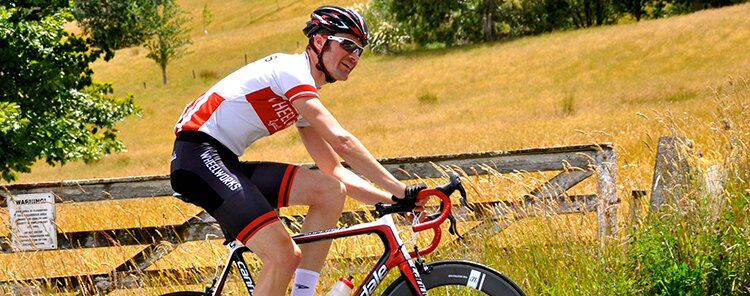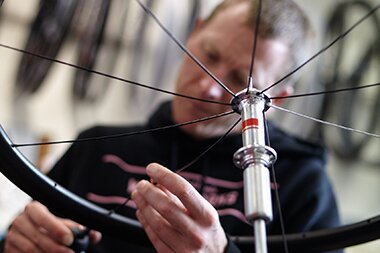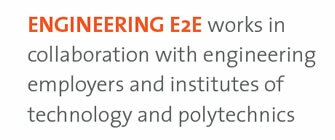EDUCATION LINKS CASE STUDY
NZDE helps cycling entrepreneur grow his business

Entrepreneur Tristan Thomas enrolled in a New Zealand Diploma in Engineering (NZDE) to build the knowledge and practical skills needed to run his own business. Wheelworks, set up as a part-time company in 2007, produces customised bike wheels and now exports products overseas.
Tristan’s story begins in Canada, where he enjoyed cycling and worked in a bicycle shop. In 2002, during a break from his university studies in Computer Science, he travelled to New Zealand and eventually decided to settle here. Tristan worked in Wellington bike shops over the next five years and realised there was a gap in the market. Local cyclists wanted access to specialised expertise and the opportunity to get wheels customised to suit their specific bikes and cycling needs.
Setting up a new business
 With an interest in bikes, the design process and owning his own business, Tristan established Wheelworks. The new company would specialise in bicycle wheels – offering advice to customers, doing repairs, and focusing on designing and building wheels to fit clients’ specific needs. Customising wheels is now all that Wheelworks does, Tristan says. “People come to us and say, ‘This is the sort of bike rider I am, this is what I’m looking for in a bike...’ and we come up with a design solution.”
With an interest in bikes, the design process and owning his own business, Tristan established Wheelworks. The new company would specialise in bicycle wheels – offering advice to customers, doing repairs, and focusing on designing and building wheels to fit clients’ specific needs. Customising wheels is now all that Wheelworks does, Tristan says. “People come to us and say, ‘This is the sort of bike rider I am, this is what I’m looking for in a bike...’ and we come up with a design solution.”
In preparation for setting up the company, Tristan took night classes at WelTec to learn how to use a lathe and mill. He was very much aware that experience, enthusiasm and a “fascination with designing stuff” would only take him so far and that he lacked formal training in engineering. Tristan’s next step was to study engineering.
Wheelworks website
Enrolling in an engineering qualification
 After considering the various engineering-related qualifications available, Tristan decided against studying at university because their degree courses didn’t have any practical component. He instead looked at what the polytechnics offered. “I liked what the polytechnics were doing, and that they provided a machinery shop for practice. I wanted to get into that side of things with my business.”
After considering the various engineering-related qualifications available, Tristan decided against studying at university because their degree courses didn’t have any practical component. He instead looked at what the polytechnics offered. “I liked what the polytechnics were doing, and that they provided a machinery shop for practice. I wanted to get into that side of things with my business.”
Tristan enrolled in a NZDE (Mechanical) at WelTec and continued to run Wheelworks as a part-time venture, applying his new knowledge and skills to his work along the way. “I have always enjoyed learning about the process of things, so it was nice to get some formal training about what process is, about manufacturing, and how to optimise your manufacturing processes. How, for example, in processing you break a task or challenge into individual chunks and at the end it all comes together as a whole.”
The Centre for Smart Product
 WelTec’s applied research and development centre – The Centre for Smart Product – is based at Industrial Research’s Hutt valley campus and aims to support high-value manufacturing in the Hutt Valley. In addition to core staff, Weltec staff and students assist with projects. Invited to join the Centre, Tristan “jumped at the opportunity. They do pretty cool projects and things.” One of the advantages, he explains, is being able to access equipment not generally available to students. “I was able to work on rapid prototyping and 3D printing at a time when a 3D printer was a hugely expensive process – it was cutting-edge stuff so being able to use the equipment was just fantastic.”
WelTec’s applied research and development centre – The Centre for Smart Product – is based at Industrial Research’s Hutt valley campus and aims to support high-value manufacturing in the Hutt Valley. In addition to core staff, Weltec staff and students assist with projects. Invited to join the Centre, Tristan “jumped at the opportunity. They do pretty cool projects and things.” One of the advantages, he explains, is being able to access equipment not generally available to students. “I was able to work on rapid prototyping and 3D printing at a time when a 3D printer was a hugely expensive process – it was cutting-edge stuff so being able to use the equipment was just fantastic.”
Having decided to study towards a NZDE because he likes the practical more than theoretical, “I like learning by doing…” Tristan enjoyed his ten hours a week at the Centre. “Working on actual products and on ideas that people brought in – it was a great way to get a full understanding of what we were learning on the course.”
Read about the Centre for Smart Product
Decision-making: where to use the NZDE
 Obtaining a NZDE provided Tristan with new options for the future, which meant making a decision about whether to continue with Wheelworks and run it as a full-time business or look elsewhere. With his qualification in demand, he could easily find work with another company and expect good prospects for advancement. Tristan still wanted to work for himself, so decided to stick with Wheelworks. From this point, he grew the business and in 2013 employed another person, with a third joining the team more recently.
Obtaining a NZDE provided Tristan with new options for the future, which meant making a decision about whether to continue with Wheelworks and run it as a full-time business or look elsewhere. With his qualification in demand, he could easily find work with another company and expect good prospects for advancement. Tristan still wanted to work for himself, so decided to stick with Wheelworks. From this point, he grew the business and in 2013 employed another person, with a third joining the team more recently.
Describing Wheelworks as “a niche business in the southern hemisphere”, Tristan says that 60% of their stock is exported to Australia. He attributes his success to a sound design process and being able to design and make specialised tools. “You think about what end result you want and work back from that. If it’s a wheel that won’t fall apart, then you look at what tools to use and what aspects you could add or remove from it.” Tristan created 90% of the tools used in the workshop. “It’s hugely rewarding, knowing that I’ve designed and made them. And that’s what gives us a competitive advantage – that I can look at what we need, then design and make a tool for that function.”
Adding to the skill set
 Not content with creating thousands of customised wheels, Tristan took on a new challenge last year and built his own bicycle. Learning to build a complete bike led him to the United Bicycle Institute (UBI) in the USA. Before that, however, he needed to learn to weld, so he headed back to WelTec and completed a six-month welding course in the evenings. A key aspect of the UBI classes, Tristan notes, is that they are taught by frame builders who work in the industry so students get a good understanding of bike building within that context.
Not content with creating thousands of customised wheels, Tristan took on a new challenge last year and built his own bicycle. Learning to build a complete bike led him to the United Bicycle Institute (UBI) in the USA. Before that, however, he needed to learn to weld, so he headed back to WelTec and completed a six-month welding course in the evenings. A key aspect of the UBI classes, Tristan notes, is that they are taught by frame builders who work in the industry so students get a good understanding of bike building within that context.
All images courtesy of Joseph Kelly. Our thanks to Tristan for his time and advice. If you have any questions or comments, please get in touch:
June 2015
 |
 |
 |
||
 |
||||
 |
||||
 |






